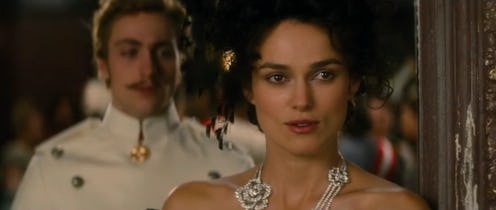Millennials and Gen-Zers love to know which characters from our favorite media we are, but what happens when you and your partner disagree about which literary couple best represents your love affair? My partner and I think we're just like a couple from Anna Karenina — we just can't agree on which one.
Here's a very brief backstory on our decade-plus relationship. We met in the fall of our freshman year of college, just before I got into a relationship with the person I eventually married. We were best friends for years, but we didn't become a couple until after my marriage dissolved. Without going into too many mushy-gushy specifics, suffice it to say that, in spite of our differences, we have a fabulous partnership, strengthened by the years we spent as BFFs.
One of those differences is our taste in movies and literature. I love classic novels and period dramas; my partner tolerates them. Every once in a while, I decide that I must, absolutely must, watch a period piece with him, and he indulges me. Watching Anna Karenina last year, and studying the novel my graduate essay on the subject, I discovered something: my partner and I cannot agree on which couple from Anna Karenina we are most like.
Anna Karenina by Leo Tolstoy, $11, Amazon
If you haven't read Anna Karenina, or if you just need a primer, here it is. Leo Tolstoy's 1877 novel centers on the overlapping love affairs of a tight-knit circle of Moscow's elite. When Prince Stiva throws his marriage to Princess Dolly into crisis by having an affair with their children's governess, he summons his sister, the eponymous Countess Anna, to his aid. She falls head over heels in love with the dashing Count Vronsky, despite being married to Count Karenin. Meanwhile, Stiva's best friend, Levin, has proposed to Dolly's sister, Princess Kitty, but she has also fallen in love with Vronsky, whom she also expects will propose. Kitty turns down Levin's offer, Vronsky spurns Kitty for Anna, and the novel takes off to the races.
During the months that I lived with Anna Karenina in print and on film, I was struck by how much I identified with Tolstoy's tragic heroine. After leaving Karenin, Anna descends into madness. She knows that she has burned her bridge back to Karenin, who may or may not give her an amicable divorce that would allow her to remarry, and she isn't sure whether Vronsky will remain faithful to her. Anna gives polite society two big middle fingers when she decides to appear in public with Vronsky — against his advice — and discovers that none of her old friends care about her anymore, having decided that she's a fallen woman.
Anna's position mirrored my feelings in the early days of my relationship with my partner, when I was unsure of how my divorce would turn out, and also terrified that my new fella would abandon me for greener pastures. When you have anxiety, every pasture looks greener than yours. He's nothing if not long-suffering, however, and a generous reading of Vronsky portrays him in the same way: as a man who loves Anna, but has a hard time dealing with her mental illness.
When I texted my partner that "we are definitely Anna and Vronsky," I expected him to agree wholeheartedly. He didn't.
"I think we're more like the other couple," he said. "The guy with the farm, who you said was from Harry Potter."
That would be Levin, portrayed by Domhnall Gleeson in the 2012 film adaptation of Anna Karenina. Potterheads will remember Gleeson as the dashing Bill Weasley in the later Harry Potter films.
The two of us as Kitty and Levin, though? He couldn't possibly be serious. Kitty and Levin lack any sense of an edge. Levin is a reluctantly political intellectual who has problems socializing with other people. Kitty is the kindest, most naive soul ever to walk the earth, and she makes Levin a better person through her goodness and charity. That's... not us. It might be us if the gender roles were reversed and Kitty dropped her naivete, but that's a very soft might.
To his credit, my partner made some fairly good points about why we are Kitty and Levin instead of Anna and Vronsky. A respectable amount of time passes between Levin's proposals, which he sees as a reflection of our own extended period as platonic friends. Kitty and Levin are much less self-destructive than Anna and Vronsky, and, because my partner is a consummate optimist, he believes that we, naturally, must be the calm and collected center of our chaotic world.
In fact, he's almost sort of offended that I would suggest we resemble Anna and Vronsky. But, let's face it: no one will ever be as adorable as Konstantin Dmitrievich Levin and Princess Ekaterina Alexandrovna Shcherbatskaya. NO ONE. Not even my partner and me. I will fight you.
It's worth saying that my partner doesn't think he and I are Levin and Kitty because we are such good, adorable people. It's just that he truly dislikes Anna and Vronsky as characters — which, you know, fair enough — and doesn't want to associate them with our relationship. I only disagree with him because I see no resemblance whatsoever between us and Anna Karenina's cutest couple, but hey, I'm a pessimist.
For me, just getting my partner to engage deeply enough with a period piece to be able to select a representative couple for us is a win. After spending years trying to make him like Downton Abbey, that he even enjoyed Anna Karenina a tiny bit is a win. So even though we don't agree on which couple from Anna Karenina we are, getting to share in our friendly Anna/Vronsky vs. Kitty/Levin rivalry has been a pretty fantastic experience. And who knows? Maybe one day I'll convince him to read the book.
